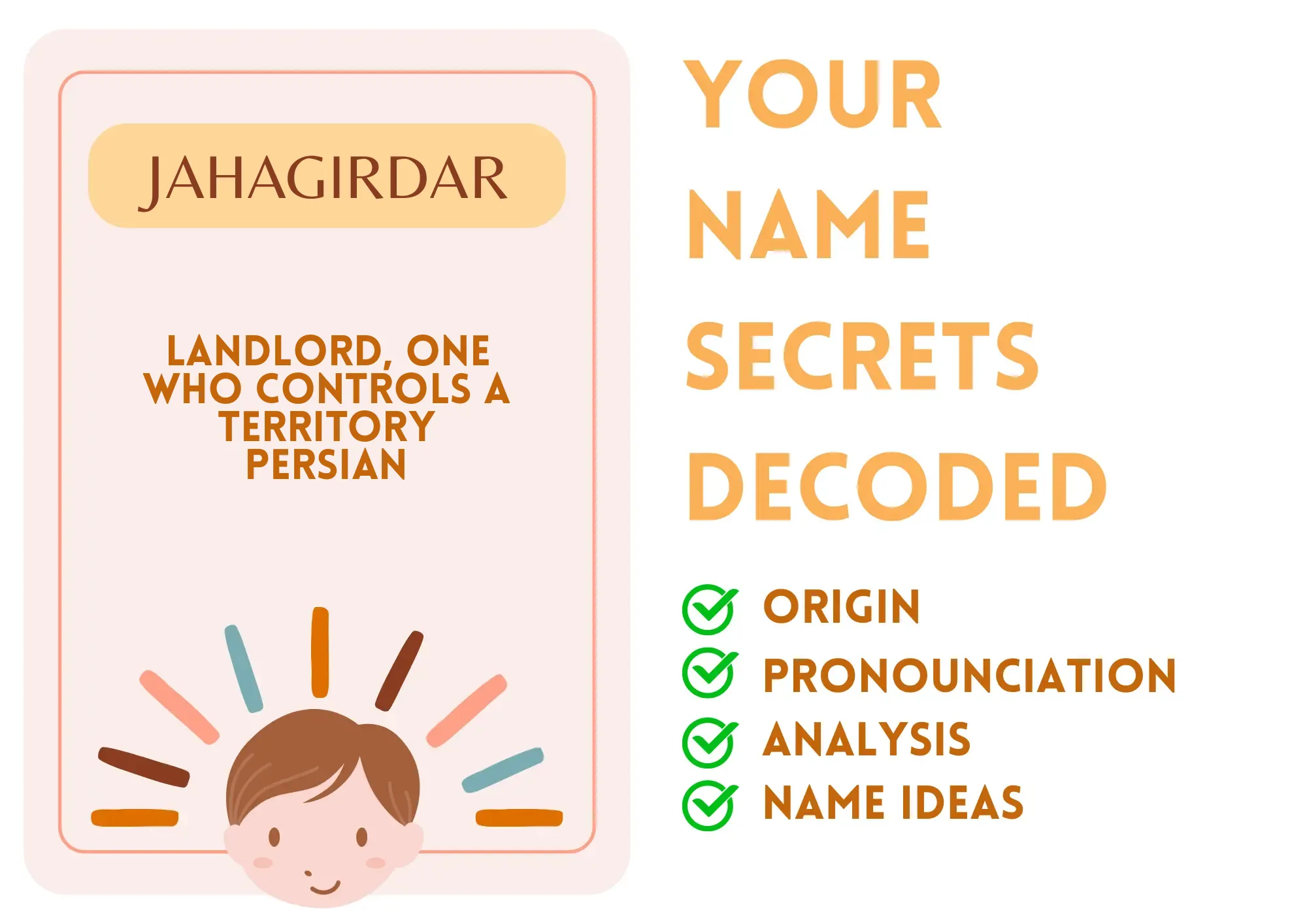
Jahagirdar
Jahagirdar is a name of Persian origin, typically interpreted as 'landlord' or 'one who controls a territory.' It stems from the roots of Persian and Urdu languages. This name is predominantly male, reflecting a historical context of authority and governance.
This name has significant cultural relevance in South Asian countries, particularly among Muslim communities, as it reflects a lineage of leadership and nobility. It conveys strength and responsibility.
Jahagirdar is generally regarded positively, being associated with attributes of power and status. The name's complexity offers a distinct charm while still being manageable for both writing and pronunciation. Common diminutives haven't traditionally emerged, but options could include 'Jahi' or 'Girdi.'
In popular culture, Jahagirdar may not frequently appear in mainstream media but resonates within historical contexts and literature, often representing figures of authority.
Basic Information
Gender: Boy
Sounds Like: Jah-ha-gir-dar
Pronunciation Explanation: The emphasis is on the second syllable 'ha', with 'gir' pronounced like 'gear' and 'dar' rhyming with 'car'.
Summary and Meaning
Meaning: landlord, one who controls a territory (Persian)
Origin: The name Jahagirdar has origins in Persian and Urdu, associated with historical roles in governance.
Usage: Jahagirdar is traditionally a masculine name, associated with strength and authority.
Name Number (Chaldean)
Name Number (Pythagorean)
Popularity (Global Rank)
Overall: 262137
Boys:
Most Popular in
Religious and Cultural Significance
Religion: Islam
Background: Jahagirdar is often favored among Muslim families in South Asia, reflecting cultural values linked to leadership and nobility.
Cultural Significance: The name is emblematic of historical land ownership and authority, pivotal in themes of governance within South Asian culture.
Historical Significance: Historically, Jahagirdar represents a class of landowners and nobles during various periods of South Asian history, particularly during the Mughal rule, where they held significant power and influence.
Popular Culture
Literature and Mythology: While not commonly found in contemporary literature, Jahagirdar can symbolize characters of power and nobility in historical novels.
Movies and Television: Occasionally referenced in dramas and historical films to depict authoritative figures, it reflects the cultural heritage of South Asia.
Feelings and Perceptions
Perception: Jahagirdar is generally perceived as a strong, dignified name, though its unfamiliarity may pose challenges.
Positive Feelings: Powerful, distinguished, authoritative, steeped in history.
Negative Feelings: May be seen as overly complex and less accessible for everyday use.
Practical Considerations
Ease of Writing and Calling: Jahagirdar is moderately complex to write and pronounce, consisting of four syllables. However, it remains memorable and unique.
Common Typos and Misspellings: Jahagidar,Jahagir,Jahagirdarh
Common Nicknames: Jahi,Girdi
Jahagirdar Popularity
Jahagirdar Usage and Popularity By Country
| Country | Rank (Overall) |
|---|---|
| India | 51775 |
| United States | 539518 |
Jahagirdar Usage and Popularity By City
| City | Rank (Overall) |
|---|
Compatibility Analysis
Famous Persons Named Jahagirdar
No results found for Jahagirdar.
Related Names
Similar Sounding Names:
Jagat,Jahan,Jagirdar